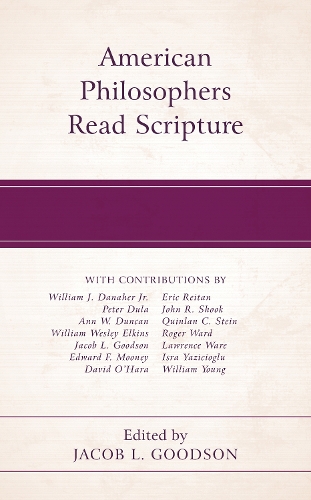
American Philosophers Read Scripture
(Hardback)
Publishing Details
American Philosophers Read Scripture
By (Author) Jacob L. Goodson
Contributions by Jacob L. Goodson
Contributions by Ann W. Duncan
Contributions by Edward F. Mooney
Contributions by William J. Danaher
Contributions by William W. Young
Contributions by Lawrence Ware
Contributions by John R. Shook
Contributions by Eric Reitan
Contributions by David OHara
Bloomsbury Publishing PLC
Lexington Books
13th December 2019
United States
Classifications
Professional and Scholarly
Non Fiction
220.601
Physical Properties
Hardback
266
Width 161mm, Height 232mm, Spine 25mm
572g
Description
This collection introduces readers to the philosophical interpretation of Scripture, specifically within American Philosophy. The purpose of the collection concerns starting a conversation about the practice and task of the philosophical interpretation of Scripture. Reflections on the philosophical interpretation of Scripture have been treated more as a conversation-stopper than a conversation-starter within the American academy. To start such a conversation, this collection offers substantive accounts of the role of Scripture in the philosophical thought of fifteen American philosophers: Jane Addams, Henry Bugbee, Stanley Cavell, John Dewey, Jonathan Edwards, Ralph Waldo Emerson, Margaret Fuller, William James, Martin Luther King, Jr., Charles Sanders Peirce, Josiah Royce, Richard Rorty, George Santayana, Henry David Thoreau, and Cornel West.
Reviews
American Philosophers Read Scripture breaks down the old reason versus revelation debate surrounding scriptural interpretation by showing how American philosophersregardless of theological tradition or religious orientationused scripture as evidence for arguments or as inspirational starting-points of musement and action. It also highlights the critical role that reading plays in the life of those who write, be it Biblical texts or not. It also works at a meta-level, as astute philosophy and religion scholars read scripture along with those classic American scholars who read scripture. The book reminds us that the philosophical life extends into whatever text we read. -- Brad Elliott Stone, Loyola Marymount University
SurprisingI am delighted but surprised by the subject of this book. I had agreed to blurb the book because I think so highly of its editor, but I confess I thought the topic to be "one off." But these are wonderful essays that not only through light on largely ignored American philosophers (Bugbee) but just as important we learn how scripture can be read in constructive manner. I cannot recommend this book highly enough because it turns out the subject is not only interesting but significant for how to go on philosophically. -- Stanley Hauerwas, Duke University Divinity School
This collection of explorations into the manner and purpose of American philosophers reading of Scripture pushes back against trends in academic philosophy that seek to block this path of inquiry. The authors investigate the question with acuity, inventiveness, and care, such that the reader wants to learn more about the philosophers, previously known or unknown, whose use of Scripture has gone unnoticed or ignored. The book is a welcome invitation to a rich and longer conversation. -- Seth Vannatta, professor and chair, Department of Philosophy and Religious Studies, Morgan State University
Author Bio
Jacob L. Goodson is assistant professor of philosophy at Southwestern College.
